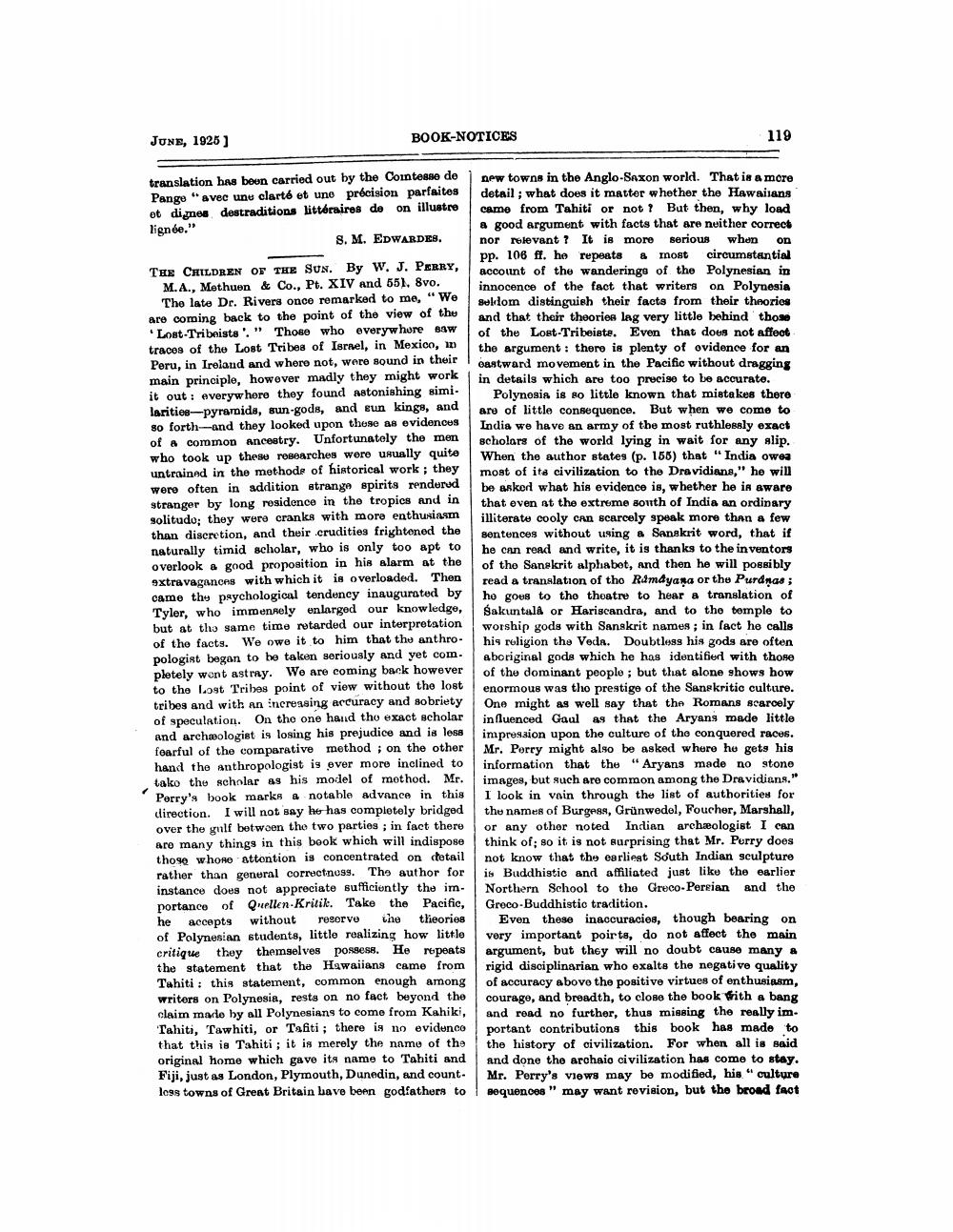________________
JUNE, 1925)
BOOK-NOTICES
119
translation has been carried out by the Countesse de ) new towns in the Anglo-Saxon world. That is a more Pange "avec une clarté et une précision parfaites detail ; what does it matter whether the Hawaiians et dignes destraditions littéraires de on illustre came from Tahiti or not? But then, why load lignée."
& good argument with facts that are neither correct S. M. EDWARDES. nor relevant ? It is more serious when on
pp. 106 ff. he repeats & most circumstantial THE CHILDREN OF THE SUN. By W. J. PERRY,
account of the wanderinge of the Polynesian in M.A., Methuen & Co., Pt. XIV and 651. 8vo.
innocence of the fact that writers on Polynesia The late Dr. Rivers once remarked to me, “We
sellom distinguish their facts from their theories are coming back to the point of the view of the
and that their theorien lag very little behind those Lost-Tribeists': " Those who everywhore saw
of the Lost-Tribeiate. Even that does not affect traces of the Lost Tribes of Israel, in Mexico, m
the argument: there is plenty of ovidence for an Peru, in Ireland and where not, were sound in their
bastward movement in the Pacific without dragging main principle, however madly they might work
in details which are too precise to be accurate. it out: everywhere they found astonishing simi.
Polynosis is so little known that mistakes there larities-pyramids, sun-gods, and sun kings, and
are of little consequence. But when we come to so forth and they looked upon these as evidenous India we have an army of the most ruthlessly exact of a common ancestry. Unfortunately the men
scholars of the world lying in wait for any alip. who took up these researches were usually quite
When the author states (p. 156) that "India owa untrained in the methods of historical work; they
most of its civilization to the Dravidians," he will were often in addition strangn spirits rendered
be asked what his evidence is, whether he is aware stranger by long residence in the tropics and in
that even at the extreme sonth of India an ordinary solitudo; they were cranks with more enthusiasm
illiterate cooly can scarcely speak more than a few than discretion, and their .crudities frightened the
sentences without using & Sanskrit word, that if naturally timid scholar, who is only too apt to
he can read and write, it is thanks to the inventors overlook a good proposition in his alarm at the
of the Sanskrit alphabot, and then he will possibly extravagances with which it is overloaded. Then
read a translation of tho Ramdyana or the Purdnas ; came the psychological tendency inaugurated by
ho goes to tho theatre to hear a translation of Tyler, who immensely enlargod our knowledge,
Sakuntall or Hariscandra, and to the temple to but at the same time retarded our interpretation
worship gods with Sanskrit names; in fact he calls of the facts. We owe it to him that the anthro
his religion the Voda. Doubtless his gods are often pologist began to be taken seriously and yet com.
aboriginal gods which he has identifier with those pletely went astray. We are coming back however
of the dominant people; but that alone shows how to the Lost Tribes point of view without the lost
enormous was tho prestige of the Sanskritic culture. tribes and with an increasing accuracy and sobriety
One might as well say that the Romans scarcely of speculation. On the one haud tho exact scholar
influenced Gaal as that the Aryans made little and archæologist is losing his prejudice and is less impression upon the culture of the conquered racus. foarful of the comparative method ; on the other Mr. Perry might also be asked where he gets his hand the anthropologist is over more inclined to information that the "Aryans made no stone tako the scholar as his model of method. Mr. images, but such are common among the Dravidians." Perry's book marks & notable advance in this I look in vain through the list of authorities for direction. I will not say he has completely bridged the names of Burgess, Grünwedol, Foucher, Marshall, over the gulf between the two parties; in fact there or any other noted Indian archæologist I can are many things in this book which will indispose think of; so it is not surprising that Mr. Purry does those whone attontion is concentrated on detail not know that the earliegt South Indian sculpture rather than general correctness. The author for is Buddhistic and affiliated just like the earlier instance does not appreciate sufficiently the im- Northern School to the Greco-Persian and the portance of Quellen-Kritik. Take the Pacific, Greco-Buddhistio tradition. he accepts without reserve the theories Even these inaccuracies, though bearing on of Polynesian students, little realizing how little very important poirte, do not affect the main critique they themselves possess. He repeats argument, but they will no doubt cause many a the statement that the Hawaiians came from rigid disciplinarian who exalts the negative quality Tahiti : this statement, common enough among of accuracy above the positive virtues of enthusiasm, writers on Polynesia, rests on no fact beyond the
| courage, and broadth, to close the book with a bang claim made by all Polynesians to come from Kahiki, and read no further, thus missing the really im. Tahiti, Tawhiti, or Tafiti; there is no evidence portant contributions this book has made to that this is Tahiti; it is merely the name of the the history of civilization. For when all is said original home which gave its name to Tahiti and and done the archaio civilization has come to stay. Fiji, just as London, Plymouth, Dunedin, and count. Mr. Perry's views may be modified, his "culture loss towns of Great Britain bave been godfathers to sequences" may want revision, but the broad fact




